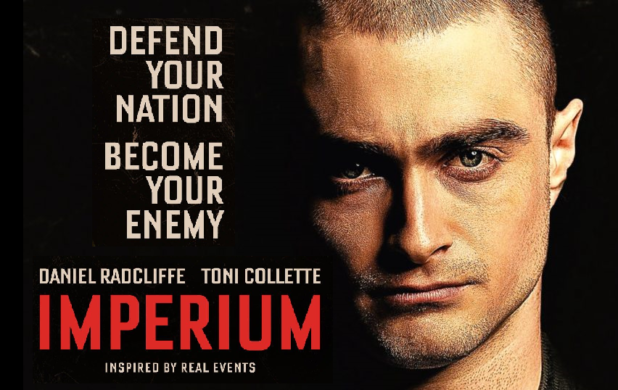Jez Turner
Western Spring
Novmeber 22, 2016
This film is designed to undermine the white advocacy movement. It will fail. Badly. Like the film ‘Cabaret’ with its iconic song, ‘Tomorrow belongs to me’, this film will bring people, good people, quality people, into our movement.
Nate is an intelligent, but lonely, classical music and literature loving young desk-bound FBI agent, bullied in, and bored with, a job overseeing the fitting up of American Muslims for conspiring to carry out acts of terrorism they really wouldn’t have the first clue about carrying out. He is persuaded to go under cover into ‘the American White Supremacist scene’.
His immediate superior, the one who does the persuading, is a peroxide-blonde, gym fanatic, adrenalin-junkie, Agent Angelo Zamparo, who, probably due to her Mexican blood/connections, has a grudge against Whites. The senior boss is a Jew who, due to all the hassle involved, tries to dissuade Nat from accepting the assignment – “You know how management feel about under-cover work, they will have you chasing paedophiles on an Indian Reservation”. The inference is far from politically correct. The FBI then are the good guys, but there isn’t much good about them, not by anybody’s moral standards, and the only thing they are actually any good at is understanding human nature.
The bad guys, on the other hand, are far more interesting. Like the race they represent, the survival of which they fight for, they come from all strata of society, all classes, all tastes and all cultural levels. While undercover, the agent Nate exposes his mind to all the unexplored regions of a world he never knew existed, far less ever understood.
The truth is in front of us – but most people are blind…. We all create a narrative based on what we think is important. We see what we want to see. But just because we are not looking at something, it doesn’t mean it isn’t there … There’s only really a handful of people who know what’s going on, but I want to be one of them. I want to make a difference … What do we dream of? What is the world we wish to build? It will be a world like the one that shaped our race in Europe. A world of forests, mountains and lakes – not a world of concrete, asphalt and garbage … That’s the world I see, that’s what keeps me strong.
The undercover agent soon finds himself on friendly terms with those he is supposed to be infiltrating; listening to Brahms and Tchaikovsky, discussing high culture and movement philosophy, and welcomed into their wholesome families and valued for what he is, not for what he owns, he warms to them and here … almost … the film could have taken an unexpected turn and become truly a classic.
He soliloquizes: How can I convert people like them? You can’t, you can only destroy them.
His mind gives him another option: Either that, or join them.
The agent of ZOG becoming an agent of White Survival would have been the twist to end all twists. Instead the film shies away into predictability. And yet there lingers a something that might have been as the supremacist leader consoles him.
It’s hard to find what we’re looking for in life. But then I listen to something like that (Brahms Clarinet Quintet) and realise that one man made something that will make millions, maybe billions of people feel like we just did. We all have that power, all of us … change the world, right wrongs, fight injustice … its people like us that feel these things the most – idealists.
For those curious about Our Cause there is much of nutritional value here. Cameo appearances are made by Francis Parker-Yockey’s Imperium, William Gayley Simpson’s Which Way Western Man, Ben Klassen ‘The White Man’s Bible’ and Louis Beam’s ‘Essays of a Klansman’ and his theory of ‘Leaderless Resistance get’s a look-in too. David Lane’s ‘Precepts’ are quoted from;
The simplest way to describe a democracy is this: Three people form a government, each having one vote. Then two of them vote to steal the wealth of the third.
At the end of the film, the FBI agent, now no longer under cover, and awaiting his transfer and promotion to yet another sterile dreary desk job, while reminiscing about the man and his comrades whom he betrayed, ruefully quotes from Byron’s ‘Manfred’:
This should have been a noble creature. He hath all the energy which would have made a goodly frame of glorious elements had they been wisely mingled.
Those words would have been better aimed at the FBI agent himself.
It all begins with the word. Prepare for the unthinkable. We are going to win.

